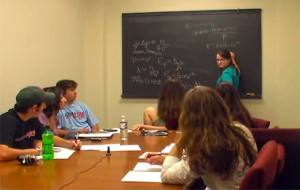 All new Peer Leaders enroll in SAM, a 1-credit course that meets once a week for 1 hour, during the fall semester in which Peer Leaders begin their appointments. In the SAM Course, Peer Leaders learn that their roles in PLTL will be to foster effective collaboration among the students in their PLTL groups, rather than to tell the students how to solve the problems or to reveal whether the group’s solutions are correct. This lesson is taught, in part, through modeling by the SAM instructors, who guide Peer Leaders using collaborative-learning strategies.
All new Peer Leaders enroll in SAM, a 1-credit course that meets once a week for 1 hour, during the fall semester in which Peer Leaders begin their appointments. In the SAM Course, Peer Leaders learn that their roles in PLTL will be to foster effective collaboration among the students in their PLTL groups, rather than to tell the students how to solve the problems or to reveal whether the group’s solutions are correct. This lesson is taught, in part, through modeling by the SAM instructors, who guide Peer Leaders using collaborative-learning strategies.
SAM Course Skills
In the SAM Course, Peer Leaders learn:
- Collaborative-learning strategies that PLTL groups will use when solving problems
- Group-facilitation techniques that Peer Leaders can use to engage all members of the group
Questioning strategies - Strategies for engaging students’ different learning preferences
Leadership skills - Communication skills
- Common problems within PLTL groups and how to solve them
Collaborative-Learning Strategies: Examples
- Round-Robin: When developing a multi-step solution to a problem, one student presents the first step, explaining the rationale behind this step and using the chalkboard to record key points or calculations. Moving around the table, each student then goes to the chalkboard to present and explain the next step, until the solution is reached.
- Scribe: One student (the scribe) goes to the chalkboard, and the other students tell the scribe what to write as the group develops a solution to the problem. The scribe may not talk, except to ask clarifying questions, and may only write what the other students say.
- Small Groups or Pairs: In groups of 2-4, students work on the problem, or parts of the problem, before reconvening for a discussion with the entire PLTL group. During this larger group discussion, the students use the chalkboard to record contributions made by each group.
Assignments
SAM assignments vary from class to class and year to year, but they generally include some combination of the following:
- Reflective papers that focus on the Peer Leader’s facilitation of the PLTL group and how the group is responding
- Response papers on essays published in the training manual (SAM Book) written by the previous year’s Peer Leaders
- Essays on Peer Leading, which will be published in the current year’s SAM book and given to new Peer Leaders the following year
- Self-evaluation essays
- Weekly, rotating, discussion-board posts